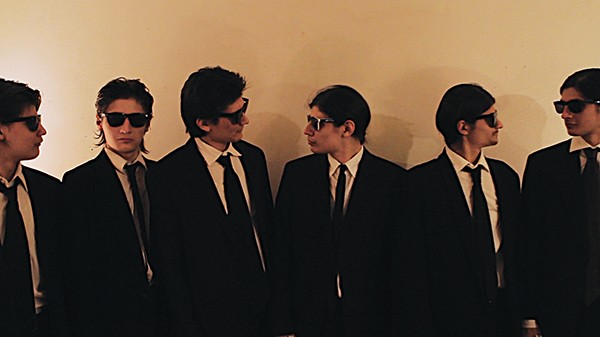The elevator pitch for Crystal Moselle’s first documentary The Wolfpack reads like a set-up for a horrible tragedy: Six brothers and a sister locked inside an apartment in New York’s Lower East Side for 15 years are slowly introduced to the world.
It is, in some respects, a tragedy. But the portrait Moselle painted of the Angulo family is more complex than that. It’s the story of family ties and patriarchy gone amok, but it’s also a story of the strength of the bond between the kids and the mythmaking power of film.
The Angulos are a global family, like many you find in New York. Their father, Oscar, is from Peru, and their mother Susanne is from Minnesota. It’s not entirely clear in the film, but Oscar was apparently a Hare Krisha around the time he met Susanne, and wanted, like Krishna, to have 10 children. Susanne could only make it to seven, each of which were named for figures from Hindu mythology: Bhagavan, Govinda, Jagadisa, Krsna, Mukunda, and Narayana. The lone daughter is named Visnu, but if she spoke in the film, I missed it.

The Brothers Angulos from The Wolfpack
After the family was stranded in New York while attempting to get to Scandinavia, they holed up in their apartment. Oscar had the only key, and forbade everyone to go out outside without permission. One of the most chilling quotes in the film is from one of the boys, who says the most they ever got to go outside in one year was nine times. “One particular year, we never go out at all.”
Director Moselle happened to run into the group on the street while she was a student at NYU and befriended them because they shared her passion for movies. To while away the long, lonely hours trapped in a shabby, four-bedroom apartment, the kids watched and reenacted movies. The Godfather and The Godfather, Part II topped their list of favorites from the more than 5,000 titles they had on DVD and VHS, but they were also big fans of Quentin Tarantino, and adopted the sunglasses and dark-suit look from Reservoir Dogs as a sort of tribal uniform. The VHS footage of some of their elaborate productions are the most compelling parts of the documentary. Their craftsmanship and dedication are inspired in a way that can only be explained by the fact that they had nothing else to do. Their homemade Batman costume, made from cereal boxes and cut-up yoga mats, would pass muster at Comic-Con. The array of cardboard weapons they made to act out gangster movies were so realistic, someone from the building where they live called the police thinking they had holed up with a vast arsenal, and the SWAT team ended up apologizing for breaking the apartment’s door down.
You would think this would be a character study, but it’s really more of a mood piece. The kids look alike because Oscar insisted that they never cut their long, black hair. One brother, Narayana, stands out because, after seeing The Dark Knight, he was inspired to break out of the apartment and explore the city block where he had lived all his life. But even when they work up the courage to defy their paranoid, authoritarian father and venture out into the world, they still stick together. The prevailing mood of the movie is fear—of the unknown, of other people outside their little tribe, and of what will happen if they never break out. It is a toxic, corrosive fear that touches on the larger human phenomenon of tribalism. It’s also clear that the kids’ worldview is almost completely shaped by movies, and as a result, they have a twisted view of reality. But it also suggests that maybe this strange family is only an extreme case of an artificial place where we all find ourselves in this media-saturated world.
The Wolfpack is thought-provoking and sometimes touching, but there is a nagging sense that Moselle didn’t dig deep enough into the abusive situation. But then again, the Angulos are so tight and so cloistered, maybe no one would ever be able to venture deeper into their world, or understand what they saw there.